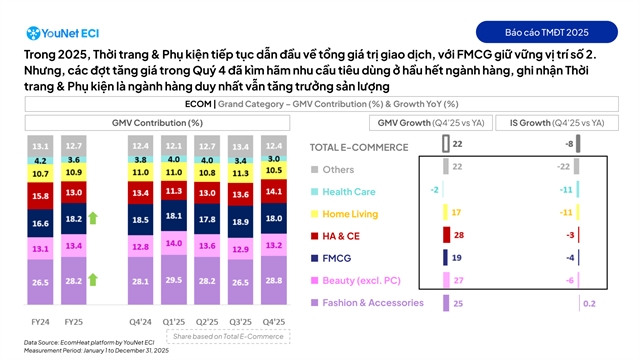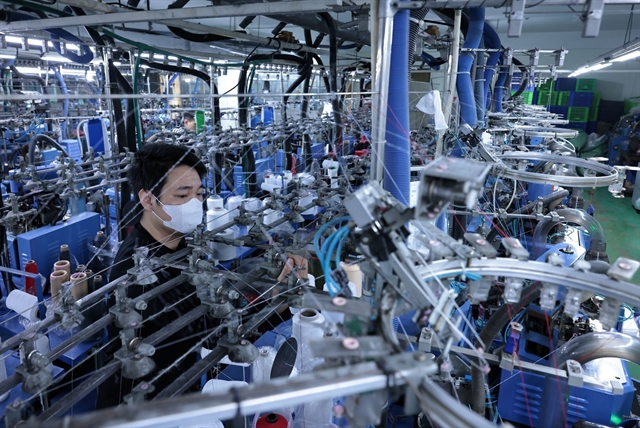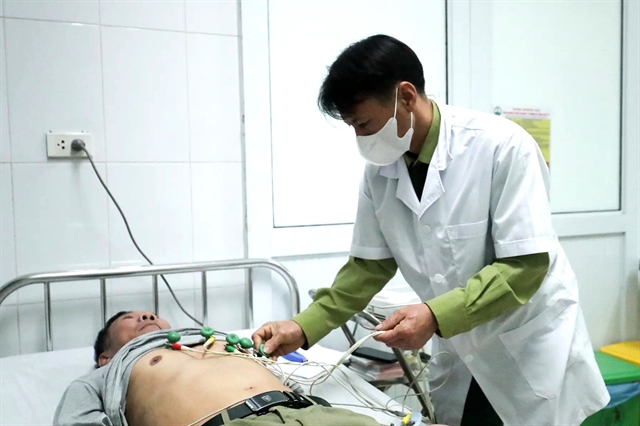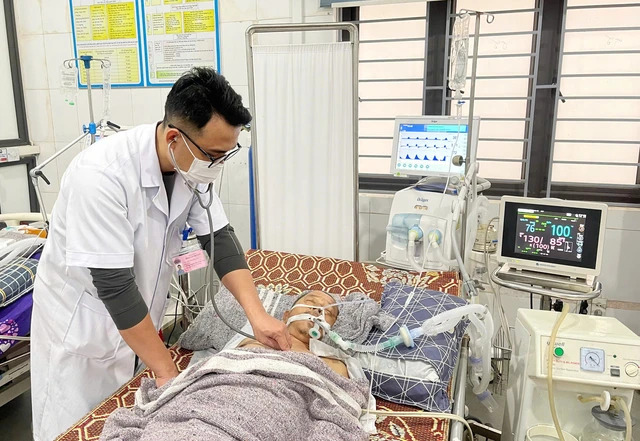 Politics & Law
Politics & Law

Major General Hoàng Kim Phụng, Director of the Việt Nam Department of Peacekeeping Operations (under the Ministry of Defence), spoke to local media about preparations and the mission of the Military Engineering Unit No.1 and the Level-2 Field Hospital No.4 that will depart on Wednesday (April 27, 2022) for UN peacekeeping mission.
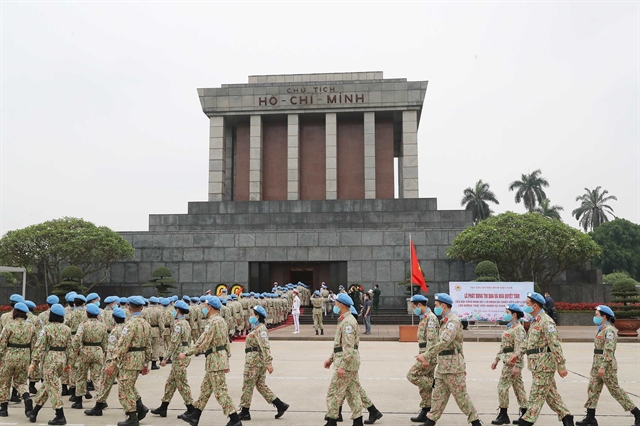
|
| Officers of the Military Engineering Unit No.1 and the Level-2 Field Hospital No.4 who will soon depart for UN Peacekeeping Mission paid tributes to the late President Hồ Chí Minh at the mausoleum in Hà Nội on April 21, 2022. — VNA/VNS Photo Trọng Đức |
Major General Hoàng Kim Phụng, Director of the Việt Nam Department of Peacekeeping Operations (under the Ministry of Defence), spoke to local media about preparations and the mission of the Military Engineering Unit No.1 and the Level-2 Field Hospital No.4 that will depart on Wednesday (April 27, 2022) for UN peacekeeping mission.
Could you give us a brief overview of the two units that will be deployed?
The deployment of these two units marks the biggest deployment of Vietnamese peacekeepers since we joined these activities in June 2014.
Regarding our military engineer unit No.1, we have had more than five years of professional preparations. The members are all high-level engineers and machinery experts selected from 21 units in the military to be trained. We have prepared very carefully in terms of human resources – from experts in general construction, to road and bridge building, as well as security personnel for the engineering unit that was picked from the special operations command.
The unit also includes communication personnel, a first-level 1 (mobile) field hospital, as well as other security personnel. This is a unit that is fully prepared in terms of attitude, professional knowledge, peacekeeping knowledge. The comrades all have knowledge of defence diplomacy and coordination skills in the multilateral environment of the UN during their upcoming duty at the UN Interim Security Force for Abyei (UNISFA).
Recently, the Central Military Commission and the Ministry of National Defence have facilitated to ensure the supplies of materiel and weapons for the engineering unit’s mission. The first supply source is the equipment available from the Ministry of Defence; the second is the conversion of some types of equipment, motorcycles, and weapons, in accordance with the UN’s requirements and standards; and the third source is the procurement of new equipment from abroad.
With these three sources, we have met the UN’s proposed missions for the engineering unit, that is, the construction of level ground, the building of bridges, ferries, ports, airports, or mobile military camps, and multi-storey buildings, etc.
Where will the first military engineering unit be deployed to?
UNISFA was established in 2011 and is situated in the conflict zone between Sudan and South Sudan in Africa. Previously, there were Ethiopian military units carrying out the peacekeeping tasks.
The UN has recently decided to pick one unit from the 15 military engineering units from some countries to select a higher-quality unit to replace the Ethiopian forces that have ended their tenures.
For this reason, Việt Nam has selected 184 engineers and they have passed the UN inspections in handling weapons and equipment, and in late October last year, the UN declared the Vietnamese unit was the most exemplary unit and was selected to be deployed to UNISFA.
Currently, the equipment and weapons that accompanied the unit - weighing over 2,000 tonnes – have been transported to Hải Phòng Port and the UN has helped bring them to Uganda.
Later, the UN will use specialised helicopters to transport the materiel to the UNISFA’s locations in May.
How has the unit been trained to meet UN requirements?
As proposed by the UN, our first military engineering unit will handle two main missions.
First, they are expected to build ground works, such as airports, harbours, drainage infrastructures, make camps for refugees, or drill wells for the use of refugees at the border area.
Second is to build high-rise buildings – but no more than four storeys. This is a task that, for many countries, takes time to prepare and requires meticulous specialised training. However, this is what the military engineers in Việt Nam have already been frequently undertaking – even at large-scale, complex, highly technical defence projects – and the expected duties are all within the parameters of what they are capable of.
I am confident that our first engineering unit will successfully complete the task that the UN will give them.
At the request of the Central Military Commission and the Ministry of Defence, the Vietnamese units taking part in the UN peacekeeping operations must not only fulfil the professional missions, but also the highest level of security of the units must be ensured.
We have entered into an agreement with the UN to guarantee that we have the right to refuse missions that are extremely high-risk, unsafe, unsecure, running contrary to Vietnamese customs and traditions, or the foreign policy conditions we have set out with the UN. Therefore, even though we deploy our engineering unit under the banner of the United Nations, we still hold some initiative and self-determination in performing the tasks that we coordinate with the UN.
It should be stressed that this is not the first time Việt Nam has sent military personnel to participate in UN peacekeeping operations.
What are the advantages that the military engineering unit has this time, given that they will enjoy the experience of their predecessors, Vietnamese officers who have served at the UN peacekeeping missions?
In the last eight years, since the day we sent the first two military observers to the deployment of the first field-hospital, and now the deployment of the first military engineering unit, we have made a long journey with increasingly complex missions.
From the independent actions of the individuals to the unit’s collective activities, their participation in the peacekeeping efforts has helped us grasp the security situation at each UN peacekeeping mission. The previous officers who have successfully completed their tasks in different areas have plenty of experience to share to ensure the military unit has comprehensive grasp of the local situation and the UN’s standard operation procedures.
We have also had measures and experience in handling relations in a multilateral environment. We have earned the locals’ trust and love, and promoted the image and reputation of the Việt Nam People’s Army, the Hồ Chí Minh’s armed forces, in countries like South Sudan and the Central African Republic.
The deployment of the military engineering unit has received the approval and confidence of the African countries involved, as well as the UN leaders.
We could be proud of the rate of Vietnamese peacekeeping officers’ fulfilment of their missions with excellence which reaches up to 33.3 per cent, while the average UN rate is only 1-2 per cent.
The Vietnamese military engineering unit also boasts a very high percentage of women with 23 people, or over 12.5 per cent, while in other countries, the percentage is only 6-7 per cent.
Similarly, our Level-2 field hospitals also have a high percentage of women, for example, the Level-2 field hospital No.3 has up to 13 women out of the 63 officers, or 17 per cent of the personnel.
Out of the 21 officers sent for individual duties such as military observers, intelligence analysts, or staff officers, four are women.
The female presence in Vietnamese peacekeeping operations is lauded and highly encouraged by the UN.
One of the causes for our peacekeeping successes is the officers’ capacity. No matter in individual independent positions or in unit formation, the Vietnamese officers can quickly adapt to the dire conditions like challenging climate, environment, or electricity and water shortages.
In October 2019, when the then Vietnamese Prime Minister Nguyễn Xuân Phúc met UN Secretary General Antonio Guterres in Thailand, the UN chief has remarked that the Vietnamese peacekeeping units are among the most capable and reputable units to fulfil the present-day duties at the UN peacekeeping missions.
In the future, Việt Nam will extend its operation area, send more units to the UN peacekeeping missions, and expand both the size and types of units to include units such as infantry, observer, military police, and public security. — VNS

